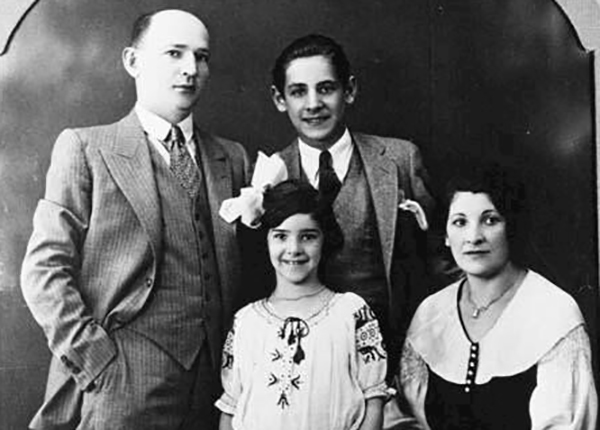Avshalomov/Bernstein 2: Bernstein’s early years
Posted on January 28, 2019

As a young man, Leonard Bernstein’s Orthodox Jewish father emigrated from a shtetl in the Ukrainian area of the “Pale of Settlement”, where the Imperial Russian government allowed Jews to live, to New York and eventually to Lawrence, Massachusetts. Leonard grew up in a tightly disciplined, observant Jewish family with two siblings, was drawn to piano before he could walk, and proved to be an unstoppable prodigy once he got lessons. He actually ascribed physical growth to discovering the piano:
“One day I was I was a scrawny little thing that everybody could beat up, and the next time I looked around I was the biggest boy in the class. I could run faster, jump higher, dive better than almost anybody [another interesting point of similarity with Avshalomov], and all the girls wanted to feel my muscles.” (Secrest, p. 15).
His father, Samuel, who had scraped his way to becoming a successful, comfortably wealthy business-owner, evidently loved to hear Leonard play Hasidic songs, but in no way considered music an acceptable career possibility; in fact, he opposed it vociferously to the point of creating ‘enmity’ between them.
Leonard was nevertheless a natural performer, absorbing all kinds of music like a sponge, playing opera back on the piano after one exposure, performing classical to show tunes anywhere and everywhere professionally from the age of 13, and writing a piano concerto in the style of Tchaikovsky and Liszt at 14.
Once at Harvard Leonard moved like a heat-seeking missile to the highest inner circles of American classical music, which were all on the East Coast, and was mentored and promoted by the greats of the time, among them the conductors Koussevitsky and Fritz Reiner, and the composer Aaron Copland. Copland steered Bernstein to Curtis for specific instruction from Reiner in conducting, and to Koussevitzky’s brand new project, a music festival called Tanglewood, in the summers. (photo: Bernstein & Copland, in Burton)
Bernstein’s singularity of purpose appeared again when World War II was on the horizon: he was living at that point in New York, trying to build his composing and conducting reputation, and decided he wanted to be placed in the music division of the USO in order to be able to serve the country without leaving his profession. Koussevitsky also formally asked for deferments for Bernstein because of his genius and a possible job as a conductor; ultimately, Bernstein was classified 4F because of asthma. According to Burton, “Bernstein felt ‘self-conscious’ about being a civilian. Copland told him not to worry: ‘You’re asthmatic and that’s that.’” The farthest Bernstein strayed from classical music was to write Broadway musicals and lighter tunes such as “I Hate Music!” with his friends; he stayed determinedly on a musical path, and his influential friends did everything they could to help him on his way.
In late 1943, Bernstein’s career finally took off for good when he benefited from ‘preparation meeting opportunity”, as the saying goes, in one of the biggest ‘overnight success’ stories ever, a moment that happens to bear directly on the Jeremiah.
As ‘assistant conductor’ of the New York Philharmonic, an impressive-sounding but very low-profile position, he was suddenly called to conduct a radio-broadcast concert one evening with only a few hours’ notice, and despite intense nerves, blew the house apart: the *orchestra members* gave him a standing ovation, telegrams poured in from all over, and on a personal level:
“For Sam [Leonard’s father] it was a pivotal moment in his relationship with his son; he was, the young conductor remembered, ‘all aglow…absolutely dazzled, bewildered, stupefied…he suddenly realized that it was all possible. And there was a great moment of forgiveness and very deep emotion.’ At that instant Bernstein decided to dedicate his Jeremiah Symphony [which he was composing at the time] to his father.” (Burton, p. 117).
Even Bernstein’s personal reminiscence of the event was revered and documented . From then on Bernstein was an international wunderkind, with all of both the fame and notoriety that celebrity brings. A scant ten weeks later, he himself conducted the blazingly successful world premiere of the Jeremiah with his Curtis Professor Fritz Reiner’s Pittsburgh Symphony Orchestra (see the discussion of the work, below, for specific history), and repeated the triumph several times that year, establishing himself as the new face of American classical music, as both composer and conductor.
Next: Avshalomov’s early years
- Carolyn Talarr, Community Programs Coordinator

0 Comments :